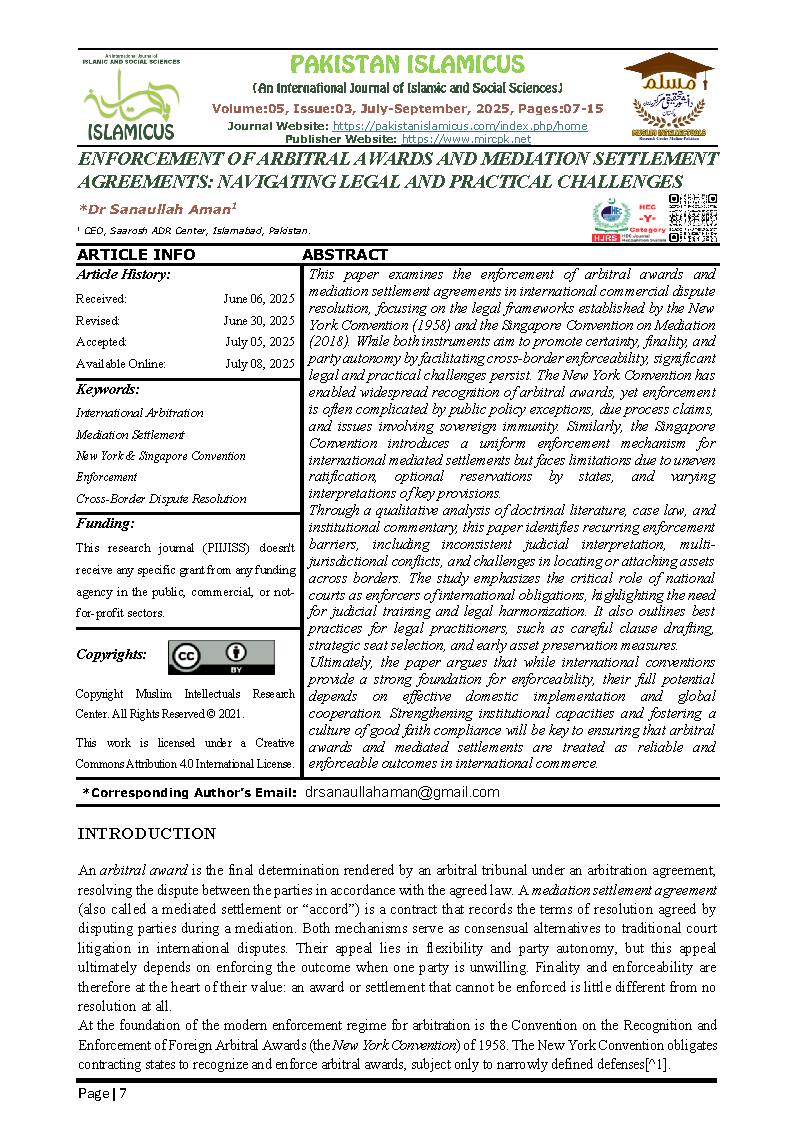ENFORCEMENT OF ARBITRAL AWARDS AND MEDIATION SETTLEMENT AGREEMENTS: NAVIGATING LEGAL AND PRACTICAL CHALLENGES
Keywords:
International Arbitration; Mediation Settlement; New York & Singapore Convention; Enforcement; Cross-Border Dispute Resolution.Abstract
This paper examines the enforcement of arbitral awards and mediation settlement agreements in international commercial dispute resolution, focusing on the legal frameworks established by the New York Convention (1958) and the Singapore Convention on Mediation (2018). While both instruments aim to promote certainty, finality, and party autonomy by facilitating cross-border enforceability, significant legal and practical challenges persist. The New York Convention has enabled widespread recognition of arbitral awards, yet enforcement is often complicated by public policy exceptions, due process claims, and issues involving sovereign immunity. Similarly, the Singapore Convention introduces a uniform enforcement mechanism for international mediated settlements but faces limitations due to uneven ratification, optional reservations by states, and varying interpretations of key provisions.
Through a qualitative analysis of doctrinal literature, case law, and institutional commentary, this paper identifies recurring enforcement barriers, including inconsistent judicial interpretation, multi-jurisdictional conflicts, and challenges in locating or attaching assets across borders. The study emphasizes the critical role of national courts as enforcers of international obligations, highlighting the need for judicial training and legal harmonization. It also outlines best practices for legal practitioners, such as careful clause drafting, strategic seat selection, and early asset preservation measures.
Ultimately, the paper argues that while international conventions provide a strong foundation for enforceability, their full potential depends on effective domestic implementation and global cooperation. Strengthening institutional capacities and fostering a culture of good faith compliance will be key to ensuring that arbitral awards and mediated settlements are treated as reliable and enforceable outcomes in international commerce.
Downloads
References
Convention on the Recognition and Enforcement of Foreign Arbitral Awards, art. I, June 10,1958, 21 U.S.T. 2517, 330 U.N.T.S. 38 [hereinafter New York Convention].
Convention on the Settlement of Investment Disputes between States and Nationals of Other States, art. 54, Mar. 18, 1965, 575 U.N.T.S. 159 (1966) [hereinafter ICSID Convention].
United Nations Convention on International Settlement Agreements Resulting from Mediation, Dec. 20, 2018, 58 I.L.M. 626 (2019) [hereinafter Singapore Mediation Convention].
Herbert Kronke et al., Guide to the Convention on the Recognition and Enforcement of Foreign Arbitral Awards 24 (1958) (UNCITRAL ed. 2012) [UNCITRAL Guide].
Timothy Schnabel, The Singapore Convention on Mediation: A Framework for the Cross-Border Recognition and Enforcement of Mediated Settlements, 19 Pepp. Disp. Resol. L.J. 1, 1 (2019).
Roger P. Alford, Crina Baltag, Matthew E. Hall & Monique Sasson, Empirical Analysis of National Court Enforcement of International Commercial Arbitration Awards, 39 J. Int’l Arb. 299, 303–05 (2022).
UNCITRAL, United Nations Convention on International Settlement Agreements Resulting from Mediation, March 20–23, 2018, Final Act and Travaux Préparatoires (2020) (providing legislative history and guidance on the Singapore Convention).
UNCITRAL, Report of the United Nations Commission on International Trade Law Working Group II (Arbitration and Conciliation) on the work of its sixty-fourth session, U.N. Doc. A/CN.9/905 (Jan. 2019).
UNCITRAL, Digest of Case Law on the Model Law on International Commercial Arbitration (2d ed. 2018) (legal commentary on arbitration enforcement issues)

Downloads
Published
Issue
Section
License
Copyright (c) 2025 PAKISTAN ISLAMICUS (An International Journal of Islamic & Social Sciences)

This work is licensed under a Creative Commons Attribution 4.0 International License.
This work is licensed under a Creative Commons Attribution 4.0 International License.
































